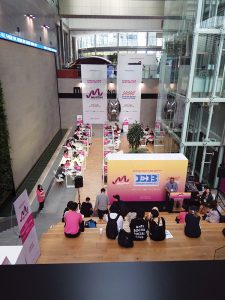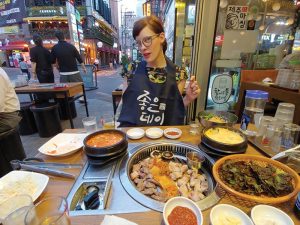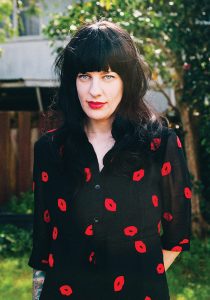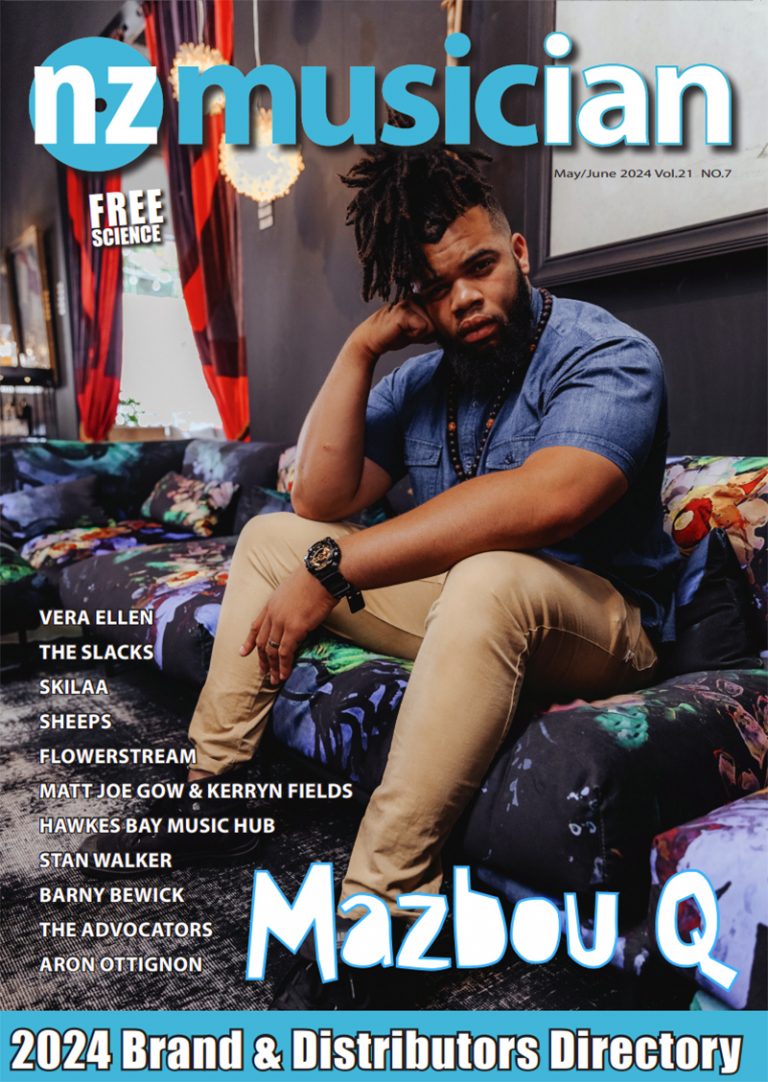On Foreign Soil: Fanfickk at MU:CON, Seoul
On Foreign Soil: Fanfickk at MU:CON, Seoul
MU:CON, which presumably stands for MUsic CONvention, is Asia’s leading music business market, focusing on the interaction and communication of the Asian and global music industries. (As copied straight from their website!) In 2018 it was staged in Seoul over three days, September 10-12, boasting approximately 11,000 attendees and 81 live shows. Kiwi musician Fanfickk was there hoping to fit in some Korean BBQ and secure distribution of her quirky, synth-pop music in the homeland of 52M K-pop fans.
MU:CON Seoul 2018, Sept. 10-12 (and a brief introduction to K-pop)
The Convention
I arrived at the convention space with my shiny new business cards and the nervous energy of a person who has never worn a lanyard. Once my delegate pass was printed out at the front desk, I had a good nosey around the convention area, which was spread out across two floors of a huge broadcasting building.
 At the ground level talks and classes were being held with fantastic names like ‘Hit Songs or Artists? K-Pop, a Different View Beyond the Forbidden Walls’ and ‘Professional Mixing Engineering: How to Make Charming Sounds’. I sat in on ‘Melody Making: How to Make a Melody that is Loved Eternally’, only to discover that it was one of about half the classes that didn’t have an English interpreter. Although I did not learn how to make melodies that are loved eternally (sorry, future listeners), I did get to spend half an hour flexing my ability to laugh at jokes I don’t understand.
At the ground level talks and classes were being held with fantastic names like ‘Hit Songs or Artists? K-Pop, a Different View Beyond the Forbidden Walls’ and ‘Professional Mixing Engineering: How to Make Charming Sounds’. I sat in on ‘Melody Making: How to Make a Melody that is Loved Eternally’, only to discover that it was one of about half the classes that didn’t have an English interpreter. Although I did not learn how to make melodies that are loved eternally (sorry, future listeners), I did get to spend half an hour flexing my ability to laugh at jokes I don’t understand.
Other fun things I didn’t manage to fully explore were the pitching and networking events, and the gear lounge. The latter was a gadget fiesta featuring brands like Ableton and iZotope. I made heart eyes at it from across the room but dared not step any closer lest I encounter a hard sell, for I am weak, and really couldn’t afford to be pushed even closer to a ramen-only diet.
Meetings
When I first signed up on the website to attend MU:CON, I discovered a ‘business matching’ function where you could book meetings with other companies. Before I’d even figured out how it worked people had started requesting meetings with me.
As the recipient of the meeting requests, I was able to choose my preferred time slots and book all of my meetings back to back at the same booth, speed dating-style. I was happy to find that the biz matching area was a comfy, café-style set up with lots of low coffee tables surrounded by mismatched chairs. There was a watercooler, an info desk, and interpreters were available free of charge.
My first meeting was a write-off because I think I’d been somehow misidentified as a tour manager or festival booker. The interpreter, my meeting partner and I took turns at giving each other looks of confusion. Swapping business cards didn’t help…
My next three meetings were with Korean distribution services, and these were far more interesting. If you’re an indie musician, you probably have a worldwide distributor such as DistroKid, that puts your music onto all the popular streaming platforms like Spotify and iTunes. It may surprise you to learn that your music is not actually available in some countries, including South Korea.

Korea has around 12 local streaming services such as Naver and Melon, while Spotify is unavailable and iTunes has a tiny market share – under 5%. If you want your music heard in Korea, you’ll need a Korean distributor.
Sounds easy enough, right? Try googling for one and you’ll soon find that it’s near impossible. There are a few companies outside of Korea that offer distribution to Korean streaming services, but it pays to be wary as they don’t always deliver, and are basically useless at communicating with the streaming platforms in the event of a problem.
Let’s take an example from my own library of experience: I used the distributor RouteNote because their website says that they can deliver to the Melon streaming store. Months after the release date, my music still wasn’t available. The company offered neither an explanation nor a refund, and I eventually had to file a dispute through PayPal to get my money back. Don’t use RouteNote.
Showcases
 All of the MU:CON music showcases were free but ticketed since they were also open to the public. The first showcase I attended was a big K-pop night, featuring 14 K-pop groups. It had sold out within minutes, but I’d still managed to get tickets because I am a fangirl with a talent for speedy booking across multiple devices. It was only later that I found out my delegate’s pass was ‘access all areas’. The more you know…
All of the MU:CON music showcases were free but ticketed since they were also open to the public. The first showcase I attended was a big K-pop night, featuring 14 K-pop groups. It had sold out within minutes, but I’d still managed to get tickets because I am a fangirl with a talent for speedy booking across multiple devices. It was only later that I found out my delegate’s pass was ‘access all areas’. The more you know…
For readers unversed in the magical ways of K-pop, please allow me to give a quick crash course. K-pop means ‘Korean pop’, as you may have guessed, but the term is actually far more specific. K-pop is created by Korean entertainment companies and presented by artists handpicked from their bootcamp-esque, in-house training systems.
Members of K-pop groups are called ‘idols’ and they’re expected (and taught) to be multi-talented entertainers, because the successful ones will inevitably end up in magazines and on TV promoting food, makeup, music, Wifi, luggage accessories, a pencil, etc. K-pop groups are usually comprised of singing idols, dancing idols, and visual idols (these are the best looking ones who may not be very good at anything else).
Every group has rappers – in recent years this has become a testament to the popularity of hip hop (Korea also boasts a deceptively broad underground hip hop scene), but traditionally the presence of rappers in idol groups is more likely attributed to favouring idols for their looks and not their voices. Rule of thumb is that Korean pop music outside the idol training system (such as indie pop) is not considered K-pop.
 The first groups to take the showcase stage were K-pop bands. These are created in the same system as the singing, dancing, rapping idols, but with the addition of instruments. I’ve seen quite a few K-pop bands in my day, but even with good songs, it’s difficult to take them seriously since they hardly ever play with their guitars plugged in.
The first groups to take the showcase stage were K-pop bands. These are created in the same system as the singing, dancing, rapping idols, but with the addition of instruments. I’ve seen quite a few K-pop bands in my day, but even with good songs, it’s difficult to take them seriously since they hardly ever play with their guitars plugged in.
After the bands, the dance groups took the stage and provided the spectacle that I and many others, usually much younger, make the pilgrimage to Korea for. Highlights were The Boyz, a 12-member boy group with a very descriptive name, and Bananalemon, a severely underrated girl group with amazing voices that I would not recommend to any artist who’s subject to regular crises of confidence in their own singing abilities.
Next evening I took my friends Preet and Michelle to another MU:CON showcase, this time in the trendy university district of Hongdae. The vibe was very different from the previous night, owing to the fact that we were now watching the indie stages. I immediately felt much more at home at this basement venue. It was dark, people were standing around probably worrying about how chill they looked, and everyone on stage had their instruments plugged in. The ‘expensive talent show’ vibe of the night before was gone.
Two things stood out about the way this showcase was managed. Firstly, there was no bar. Everyone appeared quite sober for the duration of the night, and the only bar that was part of the event was a rooftop venue a few buildings down, for delegates only. Secondly, people brought their kids along for a night of noise and entertainment. At 10pm I found myself next to an 11-year old at the front of the stage.
The first band of the night was HEO, a wistful indie synth duo who unfortunately weren’t cranked loud enough to fill the space. Noisy math rock band Dabda were a nice surprise, reminding me of some of the Kiwi bands I’d seen at the Kings Arms – to the point where everyone who talked to me about the greatness of Dabda that evening was given a brief speech on the history of Flying Nun.
The highlight of the evening was Samuel Seo with his smooth, funky electronic R&B – which on paper honestly sounds like something I would loathe. It’s a good thing that it translated really well live; his band were fantastic, and Samuel Seo himself is a born entertainer with the talent to make you do cringey crowd engagement stuff and still not hate yourself. If you want to check him out, I recommend his fruit-related song Mango with Qim Isle.
In conclusion
Although I had some good meetings and promising follow-ups, I still didn’t manage to sign with a Korean distributor. The Korean music industry appears to move slowly and really is difficult for an outsider to navigate. Despite this, I had an excellent holiday and saw some memorable and inspiring musical acts. My only regret is that I didn’t eat nearly enough Korean barbeque.

